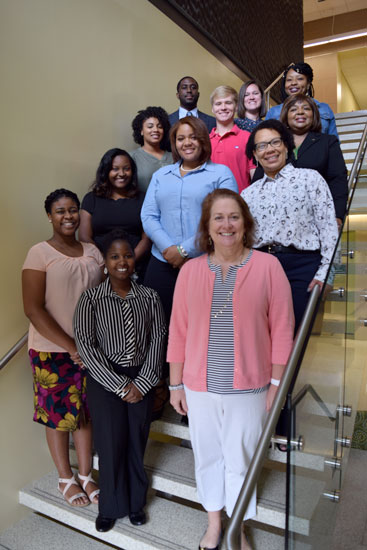UAB News

The academy will soon be open to undergraduate students across Alabama and the Southeast with an emphasis on students at UAB and at historically black colleges and universities.
The University of Alabama at Birmingham recently launched the UAB Academy for Addressing Health Disparities through Health Care Leadership. The two-week program, dedicated to increasing the racial and ethnic diversity of students in graduate level health care management education and leadership, was created by the UAB School of Health Professions’ Department of Health Services Administration with guidance from the UAB Office of Diversity, Equity and Inclusion.
The inaugural academy class includes eight undergraduates from the UAB Health Care Management and UAB Public Health programs.
“We created the academy because health care organizations need a diverse management workforce dedicated to meeting the needs of increasingly diverse patient populations,” said Allyson Hall, Ph.D., academy faculty lead and health policy professor in the UAB Master of Science in Health Administration (MSHA) and HSA Doctoral programs. “Unfortunately, many graduate programs across the country struggle to attract qualified applicants from underrepresented groups. The academy will prepare outstanding UAB students to apply, enter and succeed in competitive health care leadership programs.”
The academy lessons are highlighted by opportunities to hear from and interact with HSA alumni and students, including:
- Rica Lewis-Payton (MSHA Class 17), former Director, Birmingham VA Medical Center
- Deborah Grimes (Healthcare Quality and Safety, 2016), Chief Diversity Officer, UAB Health System
- Rodgerick Williams (HCM, 2014), Division Director, Biomedical Services, CHS
- Alexis Jackson (MSHA Class 51), Administrative Resident, Baylor Scott and White Health
The sessions, which include “Health Care: A Right or a Privilege?” and “Surviving Graduate School,” are designed to deliver firsthand, real-world experiences and provide students with the opportunity to ask pointed questions from those who have been there before.
“Many students from underrepresented areas are unfamiliar with the vast variety of career options in health care, so we included a mentoring component to ensure our students receive insight and guidance after the academy and after graduation,” said Christy Harris Lemak, Ph.D., chair, UAB Department of Health Services Administration. “We know professional development and advancement involves being a part of a strong network, and this academy will provide these students a solid foundation of peers and mentors that will set a positive tone for their future.”
“We are excited about the potential of the Academy for Addressing Health Disparities through Health Care Leadership program,” said Paulette Patterson Dilworth, Ph.D., vice president, UAB Diversity, Equity and Inclusion. “Not only is increasing diversity in health professions the right thing to do, it is the smart thing to do. This initiative builds on UAB’s reputation of valuing differences. We are committed to attracting talented students who know we will appreciate and utilize the skills, backgrounds, perceptions and knowledge they bring to the table.”
The Academy for Addressing Health Disparities through Health Care Leadership provides GRE preparation sessions, graduate school application workshops, resume building skills and leadership development activities. It consists of UAB students from underrepresented racial or ethnic groups, as well as first-generation college students with an at least 3.0 GPA. In the future, it will be open to undergraduate students across Alabama and the Southeast with an emphasis on students at UAB and at historically black colleges and universities.
“We believe that, as the top graduate program in one of the most diverse parts of the country, we have the opportunity to change of the face of health care leadership at UAB,” Lemak said. “This program will support a strong applicant pool of future leaders who will bring their own experience in communities that health care organizations serve — rural Alabama, cities across the state and region, and communities whose voices are often not represented in health care policy and management arenas. We are excited to take this step in reducing health disparities in Alabama, the Southeast and beyond by building a strong cadre of passionate, emerging leaders.”





